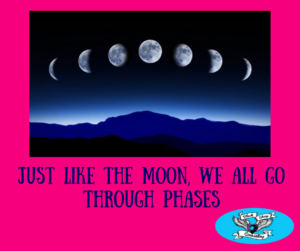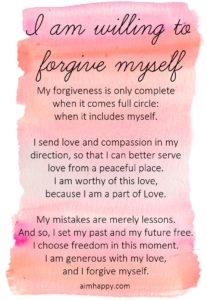Just like the moon, we all go through phases

We all make mistakes in life, but that doesn’t mean we have to pay for them the rest of their life. Bad choices do not equate to us being bad people.
I find there is a common struggle present with many of my adult clients, and it centres around shame and regret for past choices. Examples of this might be:
Relational (i.e: family estrangements, impetuous breakups),
Work related (such as staying in a dead-end job or enduring a toxic work environment),
Missed opportunities (travel, education, jobs, loves, investments, relocating/moving)
Maladaptive coping behaviours (self-harm, disordered eating, substance abuse),
Regrettable financial decisions,
the list goes on.
But here’s the thing: We ALL slip up. No one comes into this world all-knowing. We are meant to make mistakes, for that is how we learn, grow, evolve into our higher Self.
For the most part, I believe in the adage
When we know better, we do better.
It is important to note that when we are experiencing trauma and high levels of distress, our ability to access our prefrontal cortex is impeded. In layman’s terms, this means that we are often acting in reactive and impulsive ways, and we simply are not effectively able to make sound decisions (notice I use the word “we” here – this is part of our shared humanity). Another important contributing factor to our shame and regret is human developmental phases. Most people are aware that the teen years are marked by impulsivity and risk-taking behaviour, but did you know that advanced neuroscience research now suggests that the human brain is not fully matured until after we hit age 30*?? Knowing now that your brain was still developing throughout your 20’s might make a whole lot more sense to you when you review your history (it sure did for me…). Other contributing factors to our personal shame and regret inventories can come from hormonal changes in the body such as those incurred by pregnancy (“baby brain”) or menopause, side effects from prescription medications, the paranoia and delusional thinking that accompanies substance misuse, varying forms of mental illnesses, and even effects of trauma you may not be aware you have experienced (for more on this: https://blacksheepcounselling.com/2017/05/understanding-trauma/ and https://blacksheepcounselling.com/2017/08/complex-posttraumatic-stress-disorder/).
As suggested in my blog on self-compassion (https://blacksheepcounselling.com/2017/03/mindfulness-self-compassion/), we are way harder on ourselves than we are on others. If someone you love were making odd or harmful decisions while processing grief or trauma, chances are you would have some degree of compassion for them.
With some effort, such compassion can be turned inward. There is immense liberation in compassion and forgiveness. When you can forgive yourself for your past mistakes, those mistakes no longer define or wield power over you. When we know our own forgiveness, we experience the beauty of both forgiving, and forgiven. Forgiving yourself creates a ripple effect: when your relationship with Self is strengthened, your relationships with others are also enhanced. In this way, forgiving yourself is not selfish. It becomes the best gift you can give others too. ~Christine
~Christine
Reference:
*http://www.dailymail.co.uk/sciencetech/article-4055490/You-think-grown-18-brains-don-t-fully-mature-hit-30.html
